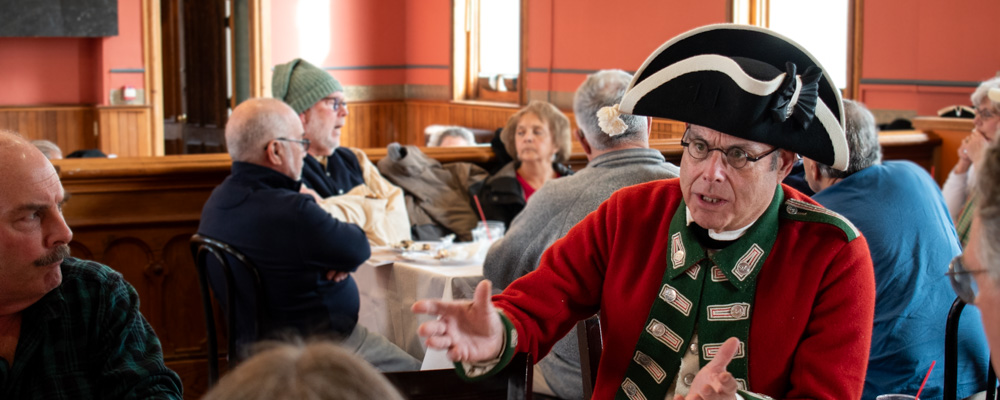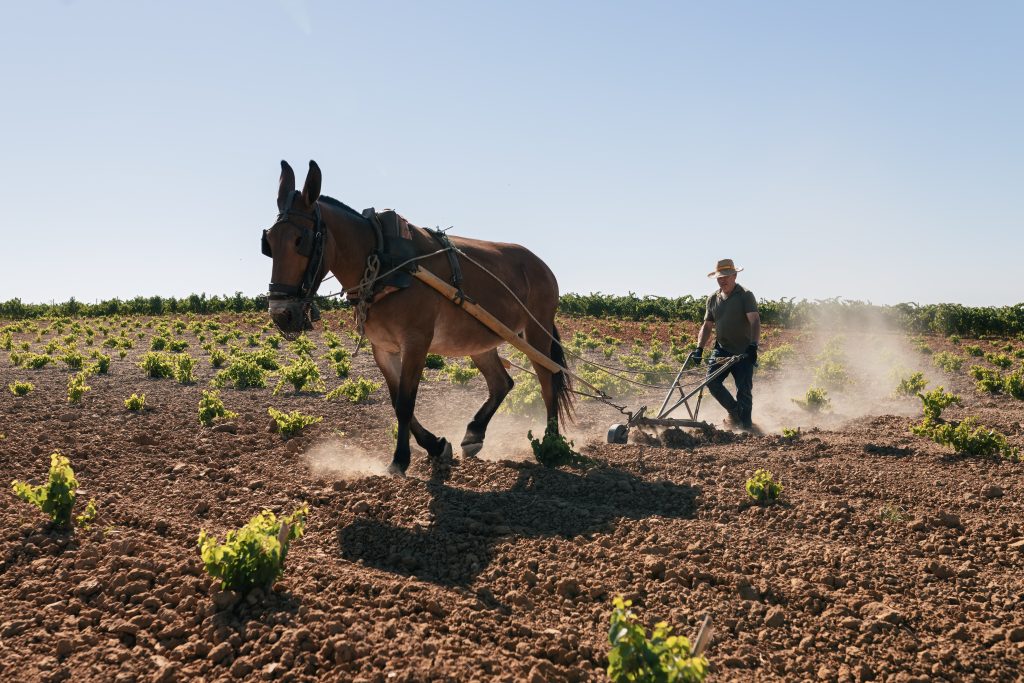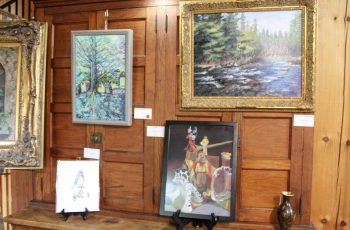As one of America’s earliest communities, Washington County, New York is the natural setting for a rich history of invention and innovation. From practical tools to groundbreaking technologies, the residents of Washington County have made significant contributions to the world. Naturally, these creations not only showcase our community’s ingenuity but also highlight creative ways the people of the past tried to make everyday life a little easier.
Let’s explore six inventions and innovations from Washington County, each having left a lasting mark on history!
See How The Past Impacts the Present Through These Neat Inventions and Innovations
1 – The Buel Fishing Lure
Julio Thompson Buel, the “Baitmaker of Whitehall,” forever changed the world of fishing with his invention of the trolling spoon.
While fishing on Lake Bomoseen in Vermont, the then 18-year-old paused for a lunch break, accidentally dropping a spoon into the water. To his surprise, while he watched as it spun and reflected light on its way down to the bottom of a lake, a large trout swooped in and scurried off with it.
Inspired by this unexpected encounter, Buel quickly began crafting a fishing lure. He modified a spoon by adding a hook and designed it to spin in the water. His creations proved so effective that he began making and selling them, eventually patenting his design.
Twenty-four years after the fish ran away with the spoon, Buel went into the fishing lure business in Whitehall, New York. It was a business that served him well for the rest of his life.
Buel took out his first patent in 1864, according to a report that appeared in the Glens Falls, New York, Post Star on January 21, 1927.
“The general demand for the spoon became such that he engaged in this manufacture in a small plant on Broad Street in Whitehall.”
Buel’s trolling spoon revolutionized fishing, providing anglers with a reliable tool for catching large fish like lake trout and bass. His invention also laid the foundation for many innovations that followed, including the weedless hook, which allowed lures to glide through thick underwater vegetation without getting snagged.
Today, nearly 200 years later, Buel’s spoons remain a staple in tackle boxes around the world, a testament to the lasting impact of his ingenuity.
2 – Rice Seed Co. Varieties
The Jerome B. Rice Seed Company played a pivotal role in transforming the agricultural landscape of the 19th century and in transforming the community of Cambridge, NY.
The business goes back to 1832 when Roswell Rice started a seed venture. Not long after, in 1834, R. Niles Rice began traveling by wagon, selling seeds door-to-door. By 1844, Niles had settled in Cambridge, New York, and expanded his business by purchasing his cousin Roswell’s seed company and another local seed house from the Crosby family, which had been in operation since 1816.
In 1865, Niles’ son, Jerome Bonaparte, joined the family business, marking the beginning of a new era for the company. Jerome’s vision and leadership helped the Rice Seed Company become the second-largest seed packet operation in the U.S., employing hundreds and supplying markets across the U.S. and Europe. During this era, the family also built the Rice Mansion Inn in Cambridge, NY, a beautiful example of Victorian architecture still standing today.
As farmers and home growers began to favor commercial seeds over saving their own from season to season, seed companies like Rice Seed Company stepped in. Rice offered a vast selection of options for market growers and home gardeners alike. They even invented their own varieties by testing and cross-breeding in their Cambridge trial gardens.
You can still find some of these heirloom Rice Seed Company varieties today, including “Early Fortune” and “Longfellow” cucumber seeds. The latter, first introduced in 1927, was developed for market growers for easier shipment to markets, with ideal length, dark green color, and excellent flavor.
Today, many Cambridge businesses operate in what was previously the Rice Seed Company campus, including another small family-owned seed company and a seed packaging company. Both businesses grew from the original Rice Seed Company, through mergers and acquisitions in the mid-1900s, to then begin anew.
In-Home Inventions and Innovations from Washington County, NY
3 – Pie A La Mode
Another Cambridge classic known across the country, the story of the invention of Pie a La Mode, with a scoop of ice cream, is debated by a few institutions.
The story goes that while visiting the hotel, Charles Watson Townsend, a professor who lived in Cambridge and frequently dined at the now-closed hotel, asked for a slice of apple pie with ice cream.
When asked by another guest what he called the dish, he named it Pie à la Mode. Or, another story goes, a nearby guest, Mrs. Berry Hall, suggested the name to Townsend.
Either way, Townsend later traveled to Delmonico’s Restaurant in New York City, and when attempting to order the dish by name, the waiter responded that he had never heard of it. Townsend chastised the waiter by stating:
“Do you mean to tell me that so famous an eating place as Delmonico’s has never heard of Pie à la Mode, when the Hotel Cambridge, up in the village of Cambridge, NY serves it every day? Call the manager at once, I demand as good serve [sic] here as I get in Cambridge.”
– “History of Apple Pie” by Linda Stradley for What’sCookingAmerica.net
The manager agreed that Pie à la Mode should henceforth be on the daily menu, and a reporter for the New York Sun newspaper, who overheard the disturbance, wrote an article about it the next day.
4 – Telescope Casual Furniture
You can’t miss this Washington County staple when traveling through Granville. Telescope Casual Furniture is one of our longest-running businesses, well-known and well-loved around the globe for its variety of outdoor furniture.
The business actually began in a similar yet distinctly different market, creating easily transportable cots, camping stools, and other furniture with telescoping legs (hence the name!) in 1903, moving to Granville in 1921 to be closer to the timber supply utilized in their products.
From there, the company expanded to similarly designed items like the world-famous director’s chairs, which feature removable covers for easy customization.
To compete with imported wooden goods, Telescope expanded its product line in the 1950s to include folding aluminum furniture, like the beach chairs you see today. The company is even responsible for developing the first outdoor sling furniture in 1966!
Today, this fifth generation family-owned business offers a variety of customizable products for their customers, from folding aluminum beach chairs to all-weather outdoor furniture.
Revolutionizing Agriculture: Farm-Focused Inventions and Innovations
5 – Cambridge Steel Plow
Also in Cambridge, Warner-Lovejoy Foundry turned out horse-drawn farm implements, including their famous Cambridge Steel Plow. While the world often credits John Deere as the “Father of the Steel Plow,” the plow developed right here in Cambridge was just as crucial to the evolution of farming technology, known as the “plow that broke the sod of the West.”
In the early 19th century, plows used by farmers were often crude wooden tools reinforced with iron. These early plows were slow and inefficient, struggling to break through the tough prairie sod. The iron moldboards often became clogged with thick, wet soils, forcing farmers to stop frequently and clean the plow by hand.
The innovation behind the Cambridge Steel Plow was not just in the material used (steel) as much as it was in the design, which allowed the plow to function effectively in any environment, including the challenging, clay-rich sod of the western plains.
The Warner-Lovejoy Foundry, initially established by Solomon W. Warner in 1844 and later expanded with the partnership of Hiram Lovejoy, utilized cutting-edge technology, including water power from Ash Grove Brook.
Since the foundry presses and hammers were water-powered, storage ponds were built on the east side of the brook to ensure the foundry could continue production, even during the driest stretches of summer.
6 – Eddy Plow
Down the river in Greenwich, the W. Eddy Plow Co. was developing its version of a steel plow.
Founded in 1832 by Walden Eddy as a foundry, the company created a range of products in the more than 100 years it remained in business. The “Rough and Ready” plow, with its unique wrought-iron beam, may be the most well-known, but Walden, his business partners, and later, his sons, developed several plows and other implements for farm and home garden use.
This included one-horse draft plows, a steel reversible level land plow, table saws, seed planters, and more. They even produced bicycles for a brief time!
The Chronological Record of the Village of Greenwich from 1809 wrote that in 1878 “all wrought iron beam plows now manufactured in this country were from Mr. Eddy’s patterns, or from those belonging to the firm of which he is now a member.”
Part of the original W. Eddy Plow Company remains along the Battenkill in Greenwich, at 25 Eddy Street.
Want to know more about Washington County, New York?
Of course, there’s much more to Washington County than our deep historic roots or well-preserved architecture.
For more information about local history, visit our 250th Anniversary page. Furthermore, you may want to check out our unique covered bridges, historical audio tours, and museums. Other top historic experiences include the Rogers Island Visitors Center, Skenesborough Museum, and the Pember Museum Library & Museum.
Need even more trip ideas? Check out our Experience Trails, which include everything from antiques, maple, and fiber to ice cream, hands-on experiences, and haunted places. Or, explore our range of great places to stay.











